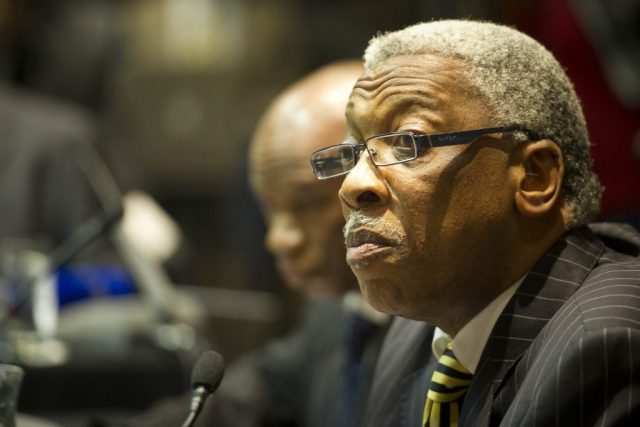

Concern at the Judicial Service Commission’s (JSC) decision not to recommend that President Cyril Ramaphosa suspend Eastern Cape Judge President Selby Mbenenge has grown since it emerged that he has laid a charge of crimen injuria against the aspirant lawyer who has accused him of sexual harassment.
A source close to the process said the decision taken in early February by the so-called “small JSC” — which excludes members of parliament — was not an easy or evident one and flouted precedent.
Commissioners decided not to recommend suspending Mbenenge because he was already on special leave, which he took after Chief Justice Raymond Zondo was urged to invite him to do so in response to allegations that he had harassed a female clerk in the Makhanda division.
“The reason for the decision of the JSC is that Judge President Mbenenge is on special leave pending the outcome of the tribunal and in this period is required to finalise all partly-heard matters,” the commission said last Wednesday.
But, in the past, a number of judges have been placed on suspension pending the outcome of investigations into allegations of serious misconduct. All of them have been required to complete work on matters they were hearing at the time.
“Since the amendment of the JSC Act in 2010, the JSC has consistently recommended that judges accused of gross judicial misconduct be placed on suspension pending a judicial conduct tribunal investigation against them,” Judges Matter said last week.
“There are at least five judges currently on suspension for various acts of misconduct: Judge John Hlophe, Judge Tintswalo Nana Makhubele, Judge Mushtak Parker, Judge Tshifiwa Maumela and Judge Nomonde Mngubisa-Thusi.”
Hlophe was suspended at a late stage, not when the complaint against him was referred to a tribunal, because the matter dates back to before the adoption of the amendment which introduced tribunals. Ramaphosa eventually suspended him late last year, pending a decision by the National Assembly to impeach him — which is set down for Wednesday.
Maumela and Parker were suspended though they were on special leave for medical reasons at the time, the source noted.
“It appears inconsistent with past decisions to suspend judges who faced serious allegations though they were already on special leave.”
In retrospect, in light of the criminal charge Mbenenge has laid against Andiswa Mengo, the decision became more troubling still, he said.
“It sends a message to women who press charges of sexual harassment against powerful men that they will not be heard or taken seriously. It becomes a question of hypocrisy.”
It is reliably understood that Mbenenge’s good reputation as a judge president in a large division was one of the factors that weighed heavily on commissioners when taking the decision. Reportedly, the equally irrelevant consideration of the respect he commands within the community and within his church was also raised by a commissioner.
A source close to the process said commissioners were almost certainly not aware of the fact that Mbenenge had laid a criminal charge against Mengo when it took the decision a fortnight ago.
JSC spokesman Mvuzo Notyesi said they had not, nor would they, take it into account.
“The JSC was not aware,” he told the Mail & Guardian.
“In any event, the criminal case is a separate, due process of law by other agencies of the state. That would have no impact on the JSC considerations.”
Notyesi’s fellow JSC spokesperson advocate Sesi Baloyi was not available for comment as she is serving as an acting judge this month.
But questions were asked on Monday as to whether it was proper for Notyesi to speak on this matter, given tha,t as an attorney, he has had a long professional relationship with Mbenenge. He instructed Mbenenge in a number of cases, while the latter was arguably the most senior advocate at the Mbatha Bar, one being Matiwane v The President of the Republic of South Africa and Others.
Mbenenge opened a case with the East London police in December and it was transferred to Pretoria soon after.
It came exactly a year after Mengo, who clerked for acting Makhanda high court judge Avinash Gonvidjee, filed a complaint of sexual harassment, which was then referred to the Judicial Conduct Committee.
She was subsequently redeployed to the office of the secretary general in the national offices of the office of the chief justice in Midrand.
The JSC decided in December that Mbenenge should face a tribunal, but no date has been set for it to commence its work.
A year ago, after screenshots of obscene messages purportedly sent to Mengo by Mbenenge were published in the Sunday press, Judges Matter called for the judge president to step down, pending the resolution of the complaint.
It also reiterated its call for the judiciary to adopt a formal policy on dealing with sexual harassment.
That issue was raised two years ago by JSC commissioners in interviews with four candidates for the post of chief justice. Zondo, who was then deputy chief justice, confirmed in his interview that no such policy was in place.
In February last year, Zondo said a committee had been set up under deputy Chief Justice Mandisa Maya to draft an anti-sexual harassment policy for the judiciary,
“So, there is some work that is going to be done. It did not happen as quickly as it should have,” he conceded.
The Judicial Service Commission said the fact that the Eastern Cape judge president has filed charges against his accuser was not relevant to its decision




